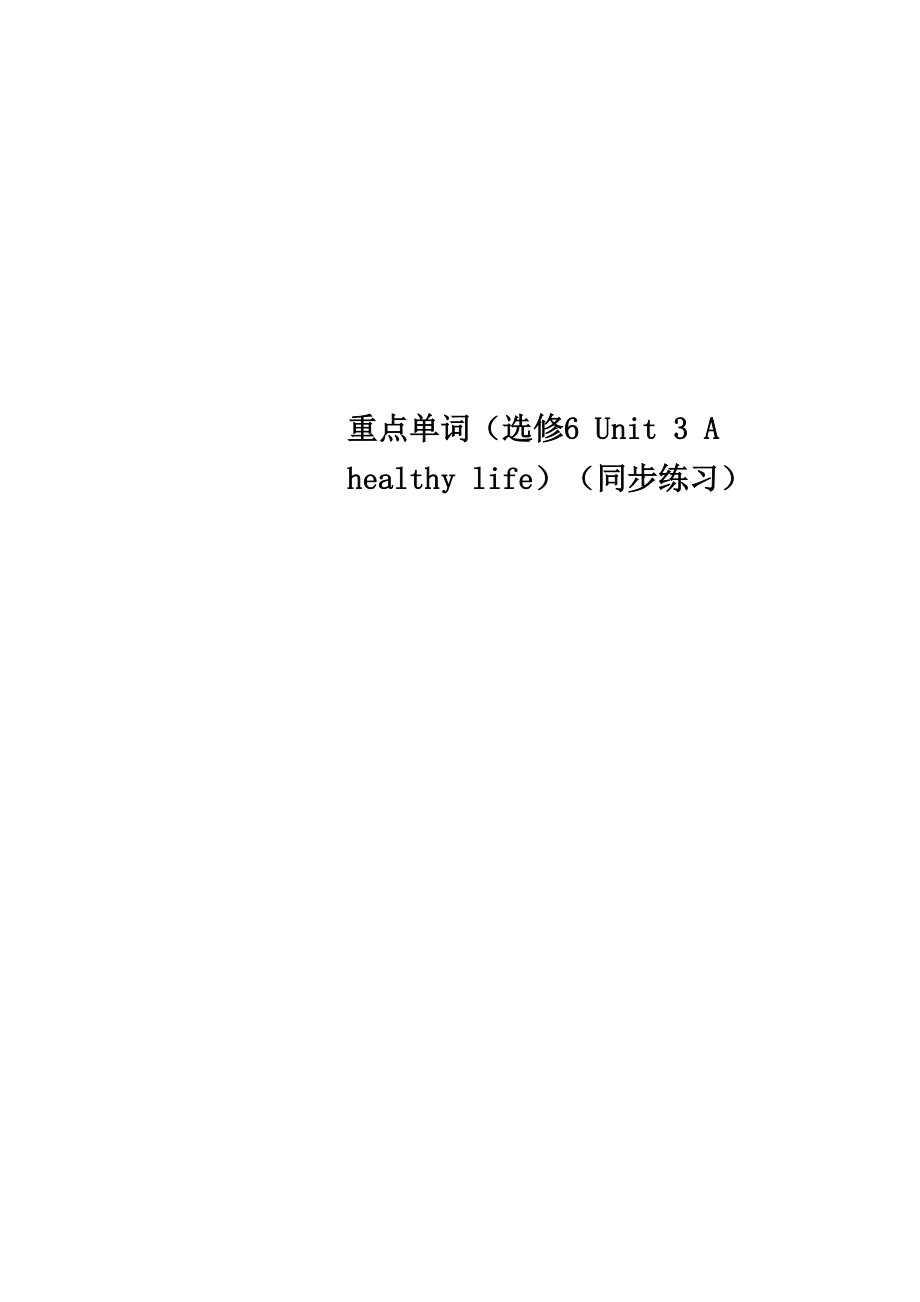《重點(diǎn)單詞(選修 6 Unit 3 A healthy life)(同步練習(xí))》由會(huì)員分享�����,可在線閱讀���,更多相關(guān)《重點(diǎn)單詞(選修 6 Unit 3 A healthy life)(同步練習(xí))(8頁(yè)珍藏版)》請(qǐng)?jiān)谘b配圖網(wǎng)上搜索��。
1�����、重點(diǎn)單詞(選修6 Unit 3 A healthy life)(同步練習(xí))
����、單詞拼寫(xiě)
答題時(shí)間:15分鐘)
1. The man had so little education that he was (不合適的) for this job.
2? Last year the local government cleared up many (非法的)entertainment
(冒險(xiǎn))his life
places.
3. The PLA man to save the old man from the burning house.
4. He's (絕望的)after b
2��、eing lost
in the desert for more than a week.
5. Watching him climb up the cliff, everybody
was (氣喘吁吁)with anxiety.
6. She has a (偏見(jiàn))against
modern music.
7. In my (判斷),we should
accept their apology.
8?His (存活���;生存)is still
uncertain, for he has been very badly hurt and may die.
二�����、七選五補(bǔ)缺題
P
3�����、ublic Speaking and Critical thinking
What is critical thinking? To a certain degree, it's a matter of logic (邏輯)一of being able to spot weakness in other people's arguments and to avoid them in your own. It also includes related skills such as distinguishing fact from opinion and assessing the sound
4�、ness of evidence.
In the broad sense, critical thinking is focused, organized thinking -- the ability to see clearly the relationships among ideas. 1 . The greatest thinkers, scientists, and inventors have often taken information that was really available and put it together differently to produce
5、new ideas. That, too, is critical thinking.
2 . As the class goes on, for example,
you will probably spend a good deal of time organizing your speeches. While this may seem like a purely mechanical (機(jī)械的)exercise, it is closely connected with critical thinking. If the structure of your speech is lo
6�����、ose and confused, chances are that your thinking is also disordered and confused. If, on the other hand, the structure is clear, there is a good chance your thinking is too. Organizing a speech is not just a matter of arranging your ideas you already have. 3 .
What is true of organization is true o
7��、f many aspects of public speaking. 4 . As you work
on expressing your ideas in clear accurate language, you will improve your ability to think clearly and accurately. 5 . As you learn to
listen critically to speeches in class, you will be better able to assess the ideas of speakers in a variety of
8�����、 situations.
If you take full advantage of your speech class, you will be able to develop your skills as a critical thinker in many circumstances. This is one reason public speaking has been regarded as a vital part of education since the days of ancient Greece.
A. Rather, it is an important part
9�����、of shaping the ideas themselves.
B. This may seem take a lot of time, but the rewards are well worth it.
C. It may also help you to know that there is no such thing as a perfect speech.
D. It has often been said that there are few new ideas in the world, only reorganized ideas.
E. If you are won
10���、dering what this has to do with your public speaking class, the answer is quite a lot.
F. The skills you learn in your speech class can help you become a more effective thinker in a number of ways.
G. As you study the role of evidence and reasoning in speechmaking, you will see how they can be use
11、d in other forms of communication as well.
三�、短文改錯(cuò)
Dear Dad,
You are very busy every day that you never pay enough attention to your health. I was worried about your health all the time. I'd like to give you some advices. I hear that walking is the best sport. Your company isn't far away from home
12、, is it? Why not to walk to the office?
week.
You'd better take exercise at most once a You can play a basketball in the gym. Going to swim is a nice choice, too. Trying not to stay up too lately. Having enough sleep can help your brain work better. Of course, this is very important to have health
13�、y food.
Dad, please receive my advice. I really wish you healthy!
Your loving daughter,
Mary
?���、單詞拼寫(xiě)
2. illegal 3. risked
4.
1. unfit desperate
6. prejudice 7.
5. breathless judgement & survival 二、七選五補(bǔ)缺題
[語(yǔ)篇解讀]
本文為說(shuō)明文�。主要介紹了“公共演講”和 “批判性思考”的相關(guān)知識(shí)。
,=j
1. D解析:上句提到��,從廣義來(lái)講�����,批判 性思考就是把思考集中并組織起來(lái)���,是明
14����、確各觀 點(diǎn)之間關(guān)系的能力;下文提到���,最偉大的思想家����、 科學(xué)家和發(fā)明家經(jīng)常把有用的信息提取出來(lái)���,重 新組合創(chuàng)造出新的觀點(diǎn)�����。由此可知,此處表明“世 界上新的觀點(diǎn)很少�,只有重新組織起來(lái)的觀點(diǎn)” organize和new為關(guān)鍵詞。
2. E 解析:概括下文內(nèi)容可知��,本段主要 舉例介紹了如何上公共演講課�,故答案為E項(xiàng)。
class為關(guān)鍵詞���。
3. A 解析:上句提到“組織一次演講不僅
是組織已有觀點(diǎn)的問(wèn)題”,由此可知下句為“而 且����,這還是形成觀點(diǎn)自身的一個(gè)重要組成部分”。
4. F解析:概括下文內(nèi)容可知���,本段主要 講了在演講課中所學(xué)的技巧如何幫助你思考�����。故 答案為F項(xiàng)�����。
5. G 解析:由上
15���、句可知��,此處為排比句�, 句型結(jié)構(gòu)相同���;從句意上看����,幾個(gè)并列排比句都 是在講所學(xué)的演講技巧對(duì)實(shí)際的幫助�����,由此可知 答案為G項(xiàng)����。
三、短文改錯(cuò)
[語(yǔ)篇解讀]本文是女兒寫(xiě)給父親的一封信�����,
建議父親經(jīng)常運(yùn)動(dòng),
健康生活��。
【思路點(diǎn)撥】短文改錯(cuò)中的錯(cuò)誤都是學(xué)生們 經(jīng)常犯的錯(cuò)誤���,修改時(shí)應(yīng)考慮語(yǔ)法和詞法知識(shí)���, 如動(dòng)詞、名詞�����、形容詞等形式的變化等��。
1. 將第一句中的very改為so 解析: so... that 引導(dǎo)結(jié)果狀語(yǔ)從句����。
2. 將第二句中的was改為am 解析:此處是 一般現(xiàn)在時(shí)��。
3. 將第三句中的advices改為advice解析: advice為不可數(shù)名詞���。
4. 將第六句中的第一個(gè)to去掉 解析:why not+動(dòng)詞原形����,表示建議。
5. 將第七句中的most改為least解析:at
least 至少����。
6. 將第八句中的 a 去掉 解析:球類(lèi)前面不 加冠詞。
7. 將第十句中的Trying改為T(mén)ry解析:此 處為祈使句����,以動(dòng)詞原形開(kāi)頭。
8. 將第十句中的lately改為late解析:late 表示時(shí)間晚�。
9. 將第十二句中的this改為it解析:it是形 式主語(yǔ)。
10.將第十三句中的receive改為accept解析: 接受意見(jiàn)用accept��。
 重點(diǎn)單詞(選修 6 Unit 3 A healthy life)(同步練習(xí))
重點(diǎn)單詞(選修 6 Unit 3 A healthy life)(同步練習(xí))

